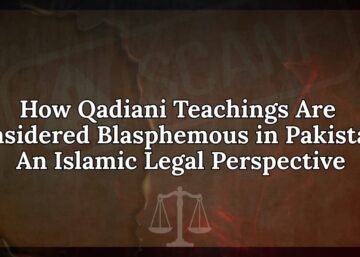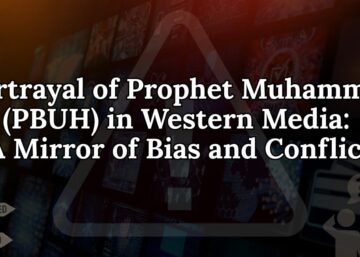The doctrine of the finality of prophethood (Khatm-e-Nubuwwat) is a cornerstone of Islamic belief, firmly established by the Qur’an, Sunnah, and the consensus of the Muslim Ummah. All four Sunni schools of jurisprudence—Hanafi, Maliki, Shafi’i, and Hanbali—unanimously affirm that Prophet Muhammad (peace and blessings be upon him) is the Seal of the Prophets (Khatam an-Nabiyyin), and no prophet will come after him. This article delves into the verdicts and opinions of the four great Imams of Sunni jurisprudence on this essential doctrine, emphasizing its significance and the consensus it holds within Islam.
- Imam Abu Hanifa (d. 767 CE) and the Hanafi School
Imam Abu Hanifa, the founder of the Hanafi school of thought, categorically affirmed the finality of prophethood as a fundamental tenet of Islam. His followers and later Hanafi scholars have consistently upheld this belief.
Verdict of Imam Abu Hanifa
In his seminal work Fiqh al-Akbar, Imam Abu Hanifa stated:
“The Prophethood of Muhammad (peace be upon him) is final, and no prophet shall come after him. Whoever claims otherwise or accepts such a claim has departed from Islam.”
This clear and unequivocal statement reflects the gravity with which Imam Abu Hanifa regarded this doctrine. He emphasized that belief in the finality of prophethood is a condition of faith (iman), and denial of it constitutes apostasy.
Hanafi Consensus
The Hanafi jurist Ibn Abidin, in his authoritative work Radd al-Muhtar, elaborates:
“A person who claims prophethood after Muhammad (peace be upon him) or believes in the prophethood of another is outside the fold of Islam. Such a belief is a direct contradiction of the Qur’an and the Sunnah.”
The Hanafi school emphasizes the protection of this doctrine as a safeguard against deviations and sectarianism.
- Imam Malik (d. 795 CE) and the Maliki School
Imam Malik ibn Anas, the founder of the Maliki school, was equally firm in affirming the finality of prophethood. His teachings and fatwas reflect a strict adherence to this belief.
Verdict of Imam Malik
Imam Malik stated:
“Anyone who claims that Muhammad (peace be upon him) is not the last prophet or entertains the possibility of another prophet appearing after him has committed disbelief (kufr). Such a person should be declared an apostate.”
Imam Malik’s position is grounded in the Qur’anic verse:
“Muhammad is not the father of any one of your men, but he is the Messenger of Allah and the Seal of the Prophets.”
(Surah Al-Ahzab: 40)
Historical Context
The Muwatta of Imam Malik, his most famous compilation, contains several traditions emphasizing the finality of prophethood. For example, one narration quotes the Prophet Muhammad (peace be upon him) as saying:
“I am the Seal of the Prophets; there is no prophet after me.”
(Muwatta Imam Malik, Book 45, Hadith 1)
Imam Malik’s commitment to this doctrine reflects his broader concern for preserving the purity and unity of Islamic belief.
- Imam Al-Shafi’i (d. 820 CE) and the Shafi’i School
Imam Al-Shafi’i, known for his rigorous scholarship and balanced approach, considered the doctrine of Khatm-e-Nubuwwat to be an essential article of faith. His writings and interpretations provide a comprehensive understanding of this belief.
Verdict of Imam Al-Shafi’i
In Kitab al-Umm, Imam Al-Shafi’i writes:
“The claim of prophethood after Muhammad (peace be upon him) is a grave transgression. The Qur’an and Hadith have conclusively closed the door of prophethood, and any assertion to the contrary is an act of disbelief.”
Imam Al-Shafi’i frequently referred to the consensus (ijma) of the Companions and scholars as evidence for the finality of prophethood. He argued that such consensus is binding and leaves no room for interpretation or doubt.
Shafi’i Perspective on Consensus
Al-Nawawi, a prominent Shafi’i scholar, reiterates:
“The consensus of the Ummah is that anyone who claims prophethood after Muhammad (peace be upon him) or denies his finality has committed disbelief. Such a person cannot remain within the fold of Islam.”
(Sharh Sahih Muslim, Kitab al-Iman)
The Shafi’i school views the denial of Khatm-e-Nubuwwat as a direct challenge to the Qur’anic text and the Sunnah.
- Imam Ahmad ibn Hanbal (d. 855 CE) and the Hanbali School
Imam Ahmad ibn Hanbal, renowned for his dedication to preserving the Sunnah, took an uncompromising stance on the issue of Khatm-e-Nubuwwat. His commitment to the authentic teachings of the Prophet Muhammad (peace be upon him) is evident in his verdicts.
Verdict of Imam Ahmad ibn Hanbal
Imam Ahmad stated:
“The belief that Muhammad (peace be upon him) is the last prophet is essential for every Muslim. Denial of this belief is disbelief (kufr), and such a person must repent. If they persist, they are no longer Muslim.”
In his Musnad Ahmad, he recorded multiple Hadiths affirming the finality of prophethood. One such Hadith is:
“The chain of messengers and prophets has ended. After me, there shall be no messenger or prophet.”
(Musnad Ahmad, Hadith 21239)
Hanbali Consensus
Ibn Qudamah, a leading Hanbali scholar, asserts:
“The door to prophethood has been closed forever. This is the consensus of the Ummah, and anyone who claims otherwise has deviated from Islam.”
(Al-Mughni, Volume 10, Page 276)
The Hanbali school’s firm stance reflects its emphasis on preserving the purity of Islamic creed and combating deviations.
- Significance of the Consensus of the Four Imams
The unanimous agreement of the four Imams on the finality of prophethood underscores its centrality in Islamic theology. Their verdicts are grounded in:
- Qur’anic Evidence:
The verse from Surah Al-Ahzab (33:40) serves as the primary foundation for this belief. - Authentic Hadiths:
Numerous Hadiths from the Prophet Muhammad (peace be upon him) explicitly affirm that he is the last prophet. - Consensus of the Companions:
The Companions of the Prophet unanimously fought against false prophets, as seen in the Battle of Yamama during the caliphate of Abu Bakr Siddiq (RA). - Preservation of Unity:
The doctrine of finality serves as a safeguard against sectarianism and deviation, ensuring the unity of the Muslim Ummah.
- Conclusion
The belief in the finality of prophethood is a cornerstone of Islamic faith, unanimously upheld by the four Imams of Sunni jurisprudence. Their verdicts leave no room for doubt or ambiguity on this matter. The finality of Prophet Muhammad (peace be upon him) not only preserves the integrity of Islamic teachings but also unites the Muslim Ummah under one creed. Any deviation from this doctrine is a direct challenge to the core principles of Islam and must be firmly refuted.
As Muslims, it is our duty to uphold this belief with conviction, educate others about its significance, and protect the purity of our faith from the influence of false prophets and their followers. By adhering to the teachings of the Qur’an, the Sunnah, and the consensus of the four Imams, we ensure the continuity of the true message of Islam for generations to come.



